- Home
- Scott Westerfeld
Mirror's Edge Page 12
Mirror's Edge Read online
Page 12
“You must have wondered what these bricks are,” she says. “They’re leftovers from a Rusty nuclear plant. Not too dangerous, because the deadly stuff is out there. You’ve been looking for it all day.”
A bewildered, nervous noise scatters through the crowd.
The girl speaks up first. “Why would Sir do that to us?”
“Because his enemies are coming for him,” Riggs says. “And he’s run out of ways to scare them.”
The crowd’s unrest is growing fearful now.
“So he sent you to look for nuclear waste, because drones would take a few more days to print.” Her voice turns cold. “A rush job, the dust told you, right?”
They stare at the pile of bricks, unwilling to believe.
But before their doubts can take hold, Col takes the scanner from Riggs and walks out into the crowd.
“Hold up your hands!” he cries.
Most of them do.
There’s a spellbound silence as he moves from person to person, waving the scanner across their palms. For long seconds, there’s only the soft scrape of his footsteps through the crowd.
Then a clicking comes from the scanner.
Col takes a step back from the boy who set it off.
“Let me guess—you got a yellow light out there.”
The boy nods, his eyes wide.
The fearful sound bubbles up again, turning to anger.
The Futures are starting to understand that their city has betrayed them.
Chulhee’s making his way from the back, the smug grin gone from his face. I think he’s going to argue against us. But he takes the scanner from Col and holds it against the bricks, staring at its screen.
I remember them arguing about the couple at the victory celebration—for the Rusty Anti-Fascist War. That was when nukes were first used. Those two cities in Japan, their names made historic.
Chulhee turns to the Futures, ashen-faced.
“We make our own stories, as always—it’s your choice. But I think we should help them.”
The girl who argued against me doesn’t say a word.
“Thanks for the save,” I say to Riggs as the meeting breaks up. “Should’ve let you make that speech in the first place.”
She nods. “I was a boss, remember? I’ve had tougher audiences than that.”
Of course—rebels vote on every mission, like pirates in pre-Rusty days. And I bet those crowds aren’t afraid to heckle.
The moment someone argued with me, I choked.
Riggs checks to make sure none of the Futures are nearby. They’re clearing out the wind tunnel around us, taking mementos, saying good-bye to their old meeting place for the last time.
“When Col called you Frey,” Riggs says softly, “I thought you might really be her. But clearly you’ve never been a boss.”
I smile. “That’s true.”
“But you’ve never been a first daughter either,” Riggs says, her voice going hard. “Rafia of Shreve is famous for her interviews. She could’ve handled that crowd. So who are you?”
My mouth falls open, but nothing comes out.
“Rafia went away to get camo-surge,” Riggs says, “and you came back. Different face, different voice, and we all just believed you were still her. But maybe Diego decided to send someone else in her place.”
A laugh forces itself out of me. The thought that I’m not myself has crossed my mind so often since the surge, it’s almost a relief to hear someone else say it.
I give her one of Rafi’s eye rolls. “They wouldn’t dare replace me.”
“She asked them to replace her—the real Rafia’s hiding in a luxury hotel somewhere, while you lead us off mission. It’s obvious you don’t care about X!”
The accusation stings, but I keep my voice level. “Don’t you think Col would notice if I was a different person?”
“He’s a city boy. He’s in on the whole thing.”
“This is brain-missing. I’m Rafi!”
Riggs cocks her head. “What did you just call yourself?”
My breath catches—I forgot to say Rafia, the name the world uses for my sister. No one but me leaves off the last letter.
Maybe it’s the long day’s hike, or the radiation leaking into my bones. Or that my father is planning another war crime to add to his list. But I can’t make any more excuses.
I’m tired of hiding myself.
I’ve been tired of hiding myself for a long time.
“You were right the first time. I’m Frey.”
She takes a step backward, half a dozen thoughts warring on her face. Then she does something unexpected—she reaches for my shirt collar and pulls me closer …
And kisses me.
The pressure of our mouths, my heartbeat in my lips, the salt of the day’s hike—all of it torrents through my head, wild and curious.
A moment later, she pulls away.
“No,” she says. “You aren’t Boss Frey.”
“Um, okay, it’s not …” I try to gather myself. “You’re right, I’m not Boss Frey. That’s my sister, Rafi. She stole my name months ago, then went looking for a crew. She found yours.”
My words run down. Too many random things, mostly that kiss, are buzzing in my head.
But I manage, “Um, so you and Rafi are …”
Riggs waves her hand—for her, that’s not the revelation that matters here. “We were. And we kept it quiet. Old boss-new boss is messy.”
So there’s such a thing as rebel etiquette.
But Rafi never told me. I lived in her lair for weeks, and she never gave me a clue that anyone was important to her.
Sometimes I think my sister is a stranger to me.
“She was lying from the start,” Riggs whispers.
“Since the Battle of Shreve. I was the one held captive in the tower, back when Col and I were supposed to get married. At first, Rafi was pretending to be me to keep my cover, but then she wanted to be a rebel.”
“She took my crew,” Riggs says. “And even after that, I still …”
I shrug. “That’s Rafi for you.”
Col appears beside us, looking a little concerned.
“Everything okay here?”
Riggs turns to him, angry. “You knew.”
“Of course,” I cut in. “Along with Charles’s and X’s crews. But that’s it.”
“Ah,” Col says, understanding now. “Sorry we hid the truth from you, Riggs. It was complicated.”
“To say the least.” She shakes her head. “X too? So much for honor among bosses. Not that I’m a boss anymore—that spoiled brat took my crew.”
“She’s more than that,” I say. “Maybe her name isn’t the important thing here. She’s still the person you …”
Kissed.
“If her name didn’t matter, then why did she use a false one?” Riggs asks, but doesn’t wait for an answer. She stalks away from us, out of the tunnel and into the night.
We don’t try to stop her.
“My fault for calling you Frey,” Col says. “I just—”
“This is my lie, not yours.”
He shakes his head. “You didn’t ask Rafia to steal your identity.”
“Our father confused things in the first place,” I say.
And we’re still confused, both of us, caught in this dance of identities. But lately I can’t tell whether my sister wants to be rid of me forever, or to turn herself into me.
She took my name, but then cut me out of her life.
Col looks out of the entrance into the darkness. “You think she’s coming back?”
I don’t answer.
When the Futures finish clearing out, Chulhee and Ran come by to say their farewells. Then Sara joins us to say that the other cliques have signed up to create their own diversions tomorrow night.
None of the three apologizes for setting us up to fail here, if that’s even what happened. Maybe I was just being paranoid.
We all make our own stories.
Th
is victory tonight feels hollow, shaky. On that stage, I felt that old gulf between me and my sister. She’s the star, and I’m just in her orbit.
And then that kiss with Riggs …
Who I don’t think is coming back. We’re close to the border—maybe she plans on slipping out of Shreve and heading home to confront my big sister.
We wait in the wind tunnel until the last of the Futures is finally gone. They’ve taken all the solar panels from the hilltop, but leave the fans whirring, using up their batteries one last time.
Once the fans spin down, the dust will creep inside again.
“Should we spend the night here?” Col asks me. “In case Riggs comes back?”
“With a bunch of radioactive bricks?”
“One night won’t hurt. But we can start hiking if you want.” He smiles, reaching into his backpack. “You even have shoes.”
A dark laugh squeezes out of me. I’d almost gotten used to being barefoot. “Where’d you find those?”
“That girl who argued with you, Terra, she wanted you to have them. She’s hiking barefoot to the train station.”
“That’s … a long way.”
“The Futures left us water and food too.”
I take Col’s backpack and look inside. More energy bars.
“Ugh. Is it okay if we start at dawn? I’m pretty tired.”
“Me too, but we’ll have to get up early.” Col looks me up and down. “Is that all you feel? Tired?”
It takes me a moment to realize what he means.
“I don’t know. What does radiation sickness feel like?”
Col’s voice goes soft. “If you throw up, that’s a problem. If your hair starts falling out, that’s a bigger problem.”
I stare at him. “My hair?”
“We’ll have to surrender. You’ll need treatment right away.”
“No,” I say. “We’re not sacrificing the whole mission for me. With Riggs gone, the others are shorthanded. We have to make it to the rendezvous point in time!”
Col looks away. “Then I guess we should get some sleep. Any more questions? By the time we wake up, the dust will be here.”
I close my eyes, searching my brain. It feels like being at the doctor’s, wondering if I’ve asked enough questions.
There’s only one thing.
“When Riggs gets home, what are the rebels going to do to my sister?”
Col sighs. “Boss Frey’s got her own rep now. Maybe she doesn’t need yours.”
“So I’ll never get my name back?”
“You’re still Frey,” he says gently. “I’d be more worried about what Riggs does next. It could get pretty intense between them.”
I remember that kiss. “It already is.”
We make a crude camp just inside the tunnel’s entrance. No fire, no air mattress, one plastic blanket wrapped around both of us for warmth. We split the last TogoBar.
Col wraps my injured ankle in a compression bandage. He checks the skin carefully, and I realize that he’s looking for radiation burns.
“Anything?” I ask.
“No. But let’s keep an eye on you.”
I nod and close my eyes, realizing that my toothpaste pills are back at camp …
It feels like only an instant before the dawn light spills into the tunnel, lighting up galaxies of dust. The fans are run down, silent and still.
We have a long way to go before the rescue starts tomorrow night, every step we hiked yesterday and hours more.
Riggs hasn’t returned.
The machines are already at work as we march away from the wind tunnel.
The battering sounds less furious this morning. Now that they’ve located the disposal sites, they must be carefully dismantling the radiation barriers, unleashing slow leaks of ancient poison back into the world.
The thought of it hastens my step—along with the fact that we have to be at the rendezvous spot by midnight. My muscles are already aching, and these new shoes are half a size too small.
As we leave the construction zone, Sir Dust speaks up.
“Thank you both for helping with safety testing yesterday. I hope it was fun.”
“Definitely fun, sir,” Col says.
Maybe not so healthy, though.
The ache in my muscles feels like more than fatigue. It reminds me of my camo-surge in the first days, a wrongness bubbling up from my marrow.
Is it my imagination? Or radiation sickness?
At least my ankle doesn’t hurt, thanks to Col’s compression bandage.
“One thing, Islyn,” the city AI adds. “We’ll have to charge you ten merits. You didn’t return your safety meter.”
I remember the red light of the meter glowing in the fissure of rock. Retrieving it didn’t seem like a priority.
“Sorry, sir. I’ll try to be more careful.”
The voice goes mercifully silent.
Merits are new to me. I grew up surrounded by wealth, but I was a nonperson, with no money of my own. My rebel friends don’t use credits of any kind.
And yet the system here has gotten under my skin—the merits in my account somehow matter to me. Maybe losing them is too much like my tutors punishing when I was a littlie—extra workouts, no dessert.
Maybe some part of me will always worry about my father’s favor.
As the morning drags on, the wind dies. The warm air grows heavy, dizzy-making around us. The water the Futures gave us is running out. After two days, energy bars have gone from joy-missing to inedible.
But we have to keep walking fast. That’s the deal I made when I went off mission.
With every step, I ask myself if it’s worth it.
I may know more about the hidden forces at work here, but I’m not sure I understand the city any better than I did three days ago.
In some ways I’m just more confused.
It’s almost noon when I stumble for the first time.
Col steadies me. “You okay, Islyn? Any nausea?”
I close my eyes, trying to feel what my body’s telling me.
“You mentioned nausea,” the dust says. “Do you need medical assistance?”
I give a hearty smile. “Just thirsty, sir.”
“Water can be delivered by med drone,” the AI says. “Two hundred merits.”
Shreve charges merits for emergency supplies. I wonder what my old friend the Paz AI would say to that.
But Col’s face lights up. “How much to bring us food, sir? Not hiking rations, but a real meal?”
“For wilderness delivery, splurge prices,” the AI says. “What kind of meal?”
“Something high protein, with lots of carbs. Maybe sushi, and half a dozen onigiri for later. Two coffees, and lots of water!”
The voice takes on a disappointed tone. “Luxury food is not in the spirit of hiking.”
“No, sir,” Col says. “But in the spirit of … fun?”
“Very well. Six thousand seven hundred merits.”
The number makes me dizzy again, but Col confirms without hesitation.
A few thousands merits won’t dent our fake accounts. But a five-star meal in the middle of nowhere might ping the city’s algorithms. Noon is too early in the day for the cliques to have started their DOA attack—we can’t afford to be flagged yet.
“Is this a good idea?” I ask Col. “We wanted to catch up with the others tonight!”
“We can’t get there if we’re too hungry to walk,” he says.
Half an hour later, the sound of lifting fans comes hurtling across the wild. The drone follows us as we find a shady spot.
The meal is packed in bright plastic hexagons, specially molded to keep every sushi roll, every elegant triangle of rice intact. The fish is straight from the Gulf, as fresh as the delicacies Rafi used to smuggle me from her parties. After a few mouthfuls, I start to feel strong again.
Maybe my stumble was from hunger, not radiation.
At least for now.
As I thank the city AI for the
food, another trick of my father’s regime becomes clearer to me …
Anything can be yours in Shreve, as long as you play by Sir’s rules.
With our bellies full, we hike hard and fast, keeping an eye on the clock.
My tongue rubs the extraction transmitter hidden in my tooth. If we don’t rejoin the others in time, Col and I can still activate our transmitters to escape Shreve.
But the mission will be too shorthanded to succeed.
Failing Boss X would be too much to bear.
I quicken my pace.
It’s still early afternoon when we pass north of the hills where we met Chulhee and Ran. At last we’re in new terrain, the forest growing thicker around us. After a morning in the sun, the shade is mercifully cool.
The scent of pine needles reminds me of my father’s hunting lodge out in the wild. Rafi and I had our first long secret talks hiking on those trails, but the signal here is two solid stars.
Our location-finders still say we’ll make it to the rendezvous point thirty minutes late. So every step has to be faster than the city AI expects of us.
As the sun starts to set, we eat the last of our onigiri while walking.
“I feel like we’re going to remember this vacation,” Col says, still chewing.
A laugh rises out of me. “Too many diversions.”
We wait for Sir Dust to add something, but he doesn’t.
And yet he’s still there in the silence.
Growing up, our father was ever-present in my life and Rafi’s. But that was in his tower, his own home. I never realized how inescapable he was for everyone else in Shreve. Even out here in the trees, his AI is listening.
I remember what Col said about the Rusty sky gods, invisible beings who watched and judged everyone on earth. In the end, maybe that’s what my father wants to become. Not merely rich and powerful, but a voice in everybody’s head.
So what happens when that voice vanishes? How will the citizens of Shreve act when no one’s forcing them to be good? How will the Futures feel, when their dramas are erased from the databanks in the name of privacy and freedom?
Hopefully, the vast minds of the free cities have considered all this. But I have a feeling they’re just going to dump it all on me.

 Uglies
Uglies Swarm
Swarm Pretties
Pretties Zeroes
Zeroes The Secret Hour
The Secret Hour Behemoth
Behemoth Peeps
Peeps Specials
Specials Goliath
Goliath Leviathan
Leviathan Extras
Extras Shatter City
Shatter City The Risen Empire
The Risen Empire Touching Darkness
Touching Darkness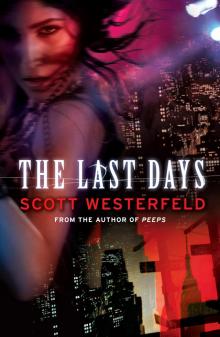 The Last Days
The Last Days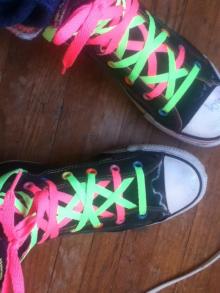 So Yesterday
So Yesterday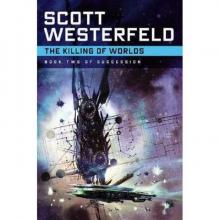 The Killing of Worlds
The Killing of Worlds Afterworlds
Afterworlds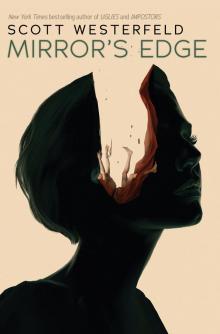 Mirror's Edge
Mirror's Edge Evolution's Darling
Evolution's Darling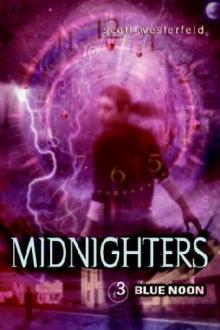 Blue Noon m-3
Blue Noon m-3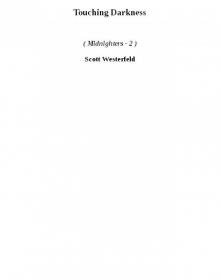 Touching Darkness m-2
Touching Darkness m-2 Impostors
Impostors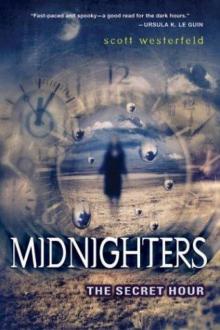 The Secret Hour m-1
The Secret Hour m-1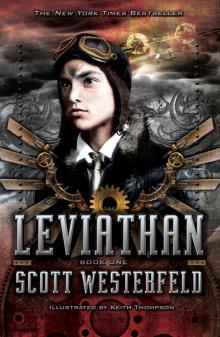 Leviathan 01 - Leviathan
Leviathan 01 - Leviathan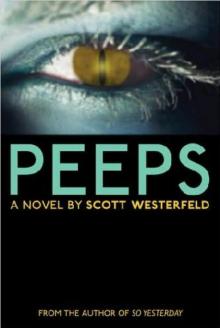 Peeps p-1
Peeps p-1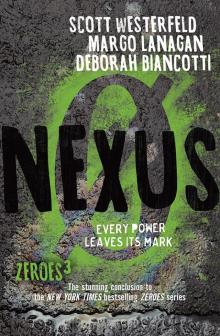 Nexus
Nexus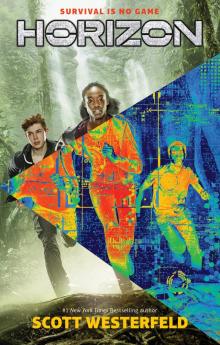 Horizon
Horizon Bogus to Bubbly
Bogus to Bubbly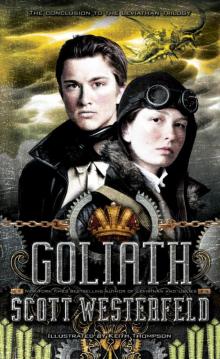 Goliath l-3
Goliath l-3 The Last Days p-2
The Last Days p-2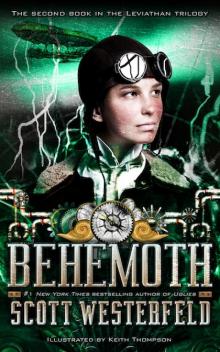 Behemoth l-2
Behemoth l-2 Stupid Perfect World
Stupid Perfect World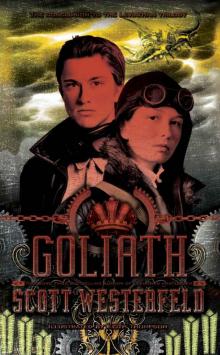 Goliath (Leviathan Trilogy)
Goliath (Leviathan Trilogy)